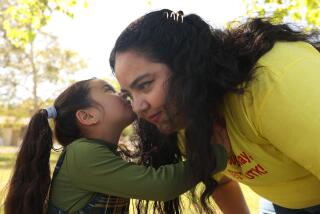Competency Test for Teachers
- Share via
The key to the issue of a national teachers’ test lies, of course, in the question, “What would be tested?” Everyone is for competent teachers, and certainly that part of teaching that involves literacy, diction, knowledge of subject matter, or methodology, of the growth and development of children, and of the psychological and sociological nature of the learning process can be tested by various kinds of examinations.
But knowing and telling do not a teacher make. Written tests would still not screen the most important qualities of the “good” teacher--those that are found in his personality structure.
What kind of pencil and paper test can discover whether the prospective teacher really likes children and youth, and whether they like him?
How does the examination find out about the teacher’s sense of humor and fair play, his objectivity, his patience, his acceptance and appreciation of individual differences, as well as racial, religious and ethnic ones? Or the teacher’s deep feelings of self-respect and worth that allow him then to value all of his students and hold high expectations for them? Or about the teacher’s ability to prize the children’s life experiences and talents, and to use them as a springboard toward the wider horizons of the common culture?
What sort of test will weed out the future teacher whose own personality inadequacies have unconsciously motivated him to enter the teaching profession in the first place (what better way is there to inflate weak egos than at the expense of captive children!)? The premise that fear is the best motivation for learning in children is usually promoted by adults who were themselves the victims of fear. In no other professions is it truer that “somebody’s hand on somebody’s head leads to somebody else’s hand on somebody else’s head.”
In my opinion, no typical examination, written or oral, can screen applicants for the kind of mature human relationship skills needed to produce a successful learning environment for children. These skills are developed only in the crucible of real experiences with live children. The only way to discover whether the prospective teacher is really meant to be an educator of our young is to give him many opportunities early in his college career, before he even enters a school of education, to work closely with children both in and out of the school setting.
Under careful observation and guidance his own true feelings about children and theirs about him will emerge, and the most important process of self-selection will begin. This exploration of the ongoing interrelationships between the teacher and the student should be a lifelong part of the teaching profession, and should involve continual analysis by the teacher himself, his students, and his peers.
The “passing” of a national or state teachers’ test based on knowledge alone is no guarantee of a successful teaching career in the public schools because most teachers who fail in their job do not fail for intellectual reasons. This is not to say that the teacher’s intellect should not be tested, but it is to say that we must also engage in an ardent search for more effective ways to examine the most important ingredients in the teacher’s makeup; his feeling life, his self-perceptions, and his interpersonal skills.
BURTON HENRY
Monterey Park




